Key Takeaways
- The base fine for a first-time cell phone ticket in California is $20, plus assessment fees of $150 or higher. Expect to pay a lot more for subsequent offenses.
- A first-time cell phone ticket doesn’t carry penalty points. But if you get a second or third ticket for cell phone use while driving, you’ll receive one point.
- California law prohibits calling and texting while driving unless you’re over 18 and use your phone in a voice-operated, hands-free mode.
- Both handheld and hands-free cell phone use is illegal for drivers under 18 unless they must call emergency services.
How Much Is a Cell Phone Ticket in California?
| Offense Type | Base Fine | Assessment | Total |
|---|---|---|---|
| First Offense | $20 | $150+ | $170+ |
| Subsequent Offense | $50 | $250+ | $300+ |
In addition to the base fines, you’ll have to pay several other fees, depending on the city and county where you got the ticket.
Want to calculate the price of a speeding ticket? Try our California speeding ticket cost calculator.
Traffic school can help you keep a clean driving record, prevent insurance increases, and more!
What You Can Do If You Get a Cell Phone Ticket in California
A cell phone ticket is an infraction, which means you won’t be charged with a crime or face any punishment beyond fines. Just make sure you do something about it, or you could end up facing more serious legal consequences, such as a failure to appear.
There are three ways to deal with a cell phone ticket in California:
Pay It
It’s best to pay your ticket unless you had a legitimate reason for using the phone while driving (more on that later!).
If you go this route, you won’t need to go to court or hire a traffic lawyer. Plus, you’ll have a higher chance of getting approved to go to traffic school – you may want this option if this is the second or third time you’ve gotten a cell phone ticket in the past three months. (Learn more in Is Traffic School Worth It?)
You can pay a cell phone ticket online, by mail, or in person at the clerk’s office, depending on the county.
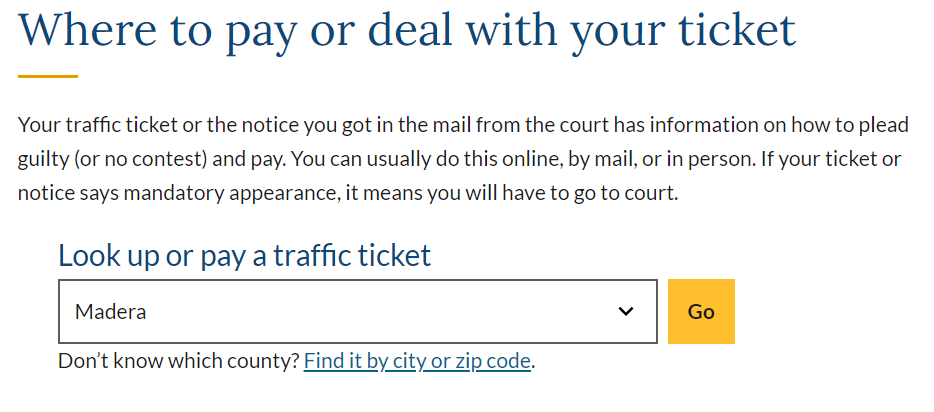
- First, visit this page on the California Courts website;
- Next, select your county from the drop-down menu under “Look up or pay a traffic ticket;”
- Click “Go” to see which payment options are available in the county where you got the ticket.
Fight It
California law allows the use of handheld phones under certain circumstances. If you fit one of the law’s exceptions, it makes sense to contest the ticket.
Valid defenses include:
- You made an emergency call to a healthcare provider, the police, the fire department, or similar services.
- You were operating an emergency vehicle and made the call for work-related purposes.
- You were driving on private property when you made the call.
- Your vehicle was pulled over.
- The officer was mistaken, and you were not using a handheld phone.
To fight a traffic ticket in California, you have to plead not guilty and ask for a trial or request a trial by written declaration. If you choose the latter, you won’t have to appear in court.
In the meantime, gather supporting evidence, such as dashcam footage and eyewitness testimony. Seeking legal assistance can significantly improve your odds of success. For example, your attorney may find and interview witnesses who can testify you were not using your phone behind the wheel. Or they could request phone records to prove you were not texting and driving.
Go to Traffic School
Attending traffic school can mask one point on your license – but can you take it for a cell phone ticket in California?
It depends.
A first-time cell phone violation won’t add a point to your license, so traffic school isn’t necessary. However, if you receive a second ticket for distracted driving (including cell phone use) within 36 months, you’ll get one point. In that case, you can request court approval for traffic school. Here’s how it works:
- Check Eligibility: You must have received a second cell phone/distracted driving ticket within 36 months.
- Plead Guilty: Accept responsibility for the violation.
- Pay the Ticket and Court Fees: This includes the fine, administrative fees, and a traffic school fee.
- Request Traffic School: Ask the court for approval to attend a DMV-licensed traffic school.
- Get Court Approval: If granted, you’ll receive a list of eligible traffic schools.
- Enroll in a DMV-Licensed Traffic School: Choose an online or in-person school approved by the California DMV.
- Complete the Course: Finish the coursework and pass the final exam.
- School Submits Completion to the DMV/Court: At Best Online Traffic School, we report your completion electronically.
- Verify With the Court: Confirm that your completion was received and processed.
Once completed, the point will not appear on your record, helping you avoid insurance rate increases.
See how traffic school works and create an account to get started for FREE.
California Cell Phone Law: What Is and Isn’t Allowed
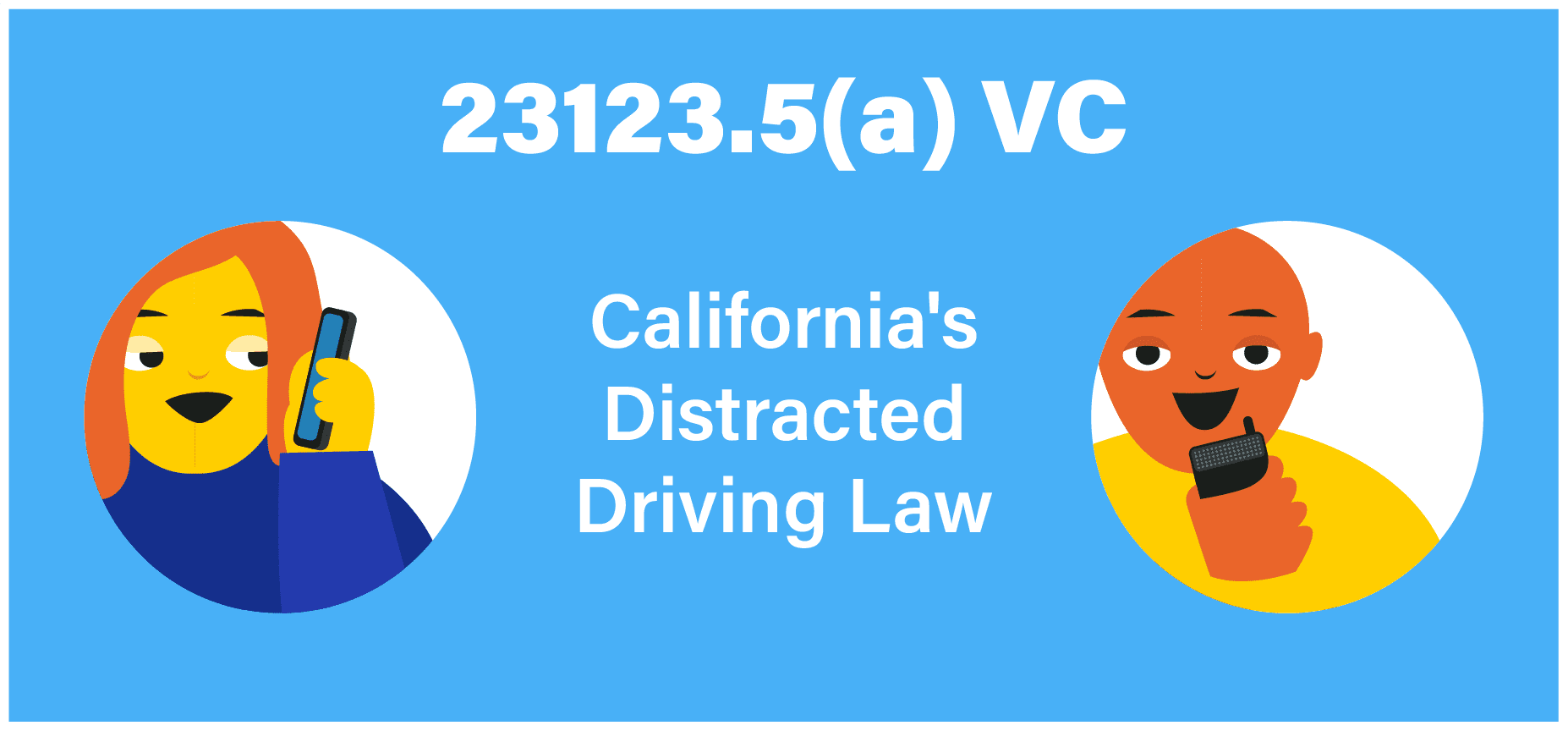
In the Golden State, cell phone use while driving is covered under sections 23123, 23123.5, and 23124 of the California Vehicle Code (CVC). These laws state the following:
- 23123(a): You may not use a mobile phone behind the wheel unless the device allows hands-free listening and talking.
- 23123.5(a): You may not text and drive or use a phone in any way that might distract your attention from the road.
- 23124(b): The use of mobile phones (hands-free or not) while behind the wheel is forbidden for drivers under 18.
- In June 2025, the California Court of Appeals reinforced that simply holding a phone – even passivley – is also against the law.
However, there are some exceptions to these rules, which we’ll discuss below. Let’s go over the main points related to cell phone use while driving so you can understand what is and isn’t allowed.
Allowed: Talking on a Cell Phone with a Hands-Free Device
You can make or receive phone calls on a speakerphone or through other hands-free means, such as via Bluetooth.
California cell phone law also states that:
- Hands-free phones must be activated and deactivated with a single swipe or tap of the driver’s finger, per VC 23123.5(c).
- The phone must be in a place in the vehicle where it won’t block your view of the road or distract your attention. This applies to portable GPS systems, tablets, pagers, and other electronic wireless communications devices, too.
Note that you may not use your smartphone in handheld mode while stopped at a red light or stuck in traffic. You still need to pay attention to your surroundings, and holding a phone in your hand could distract you.
Not Allowed: Texting and Driving

Texting, surfing the web, scrolling through social media, or using any other mobile phone functions in handheld mode is forbidden by law in California.
Previous versions of California’s cell phone law prohibited only “text-based” communication, but the newest version of the law (2020) bans all wireless device functions. For example, you may not set up your GPS while driving unless you can do it hands-free.
Read: Texting and Driving Statistics
Not Allowed: ANY Cell Phone Use While Driving for Youth Under 18
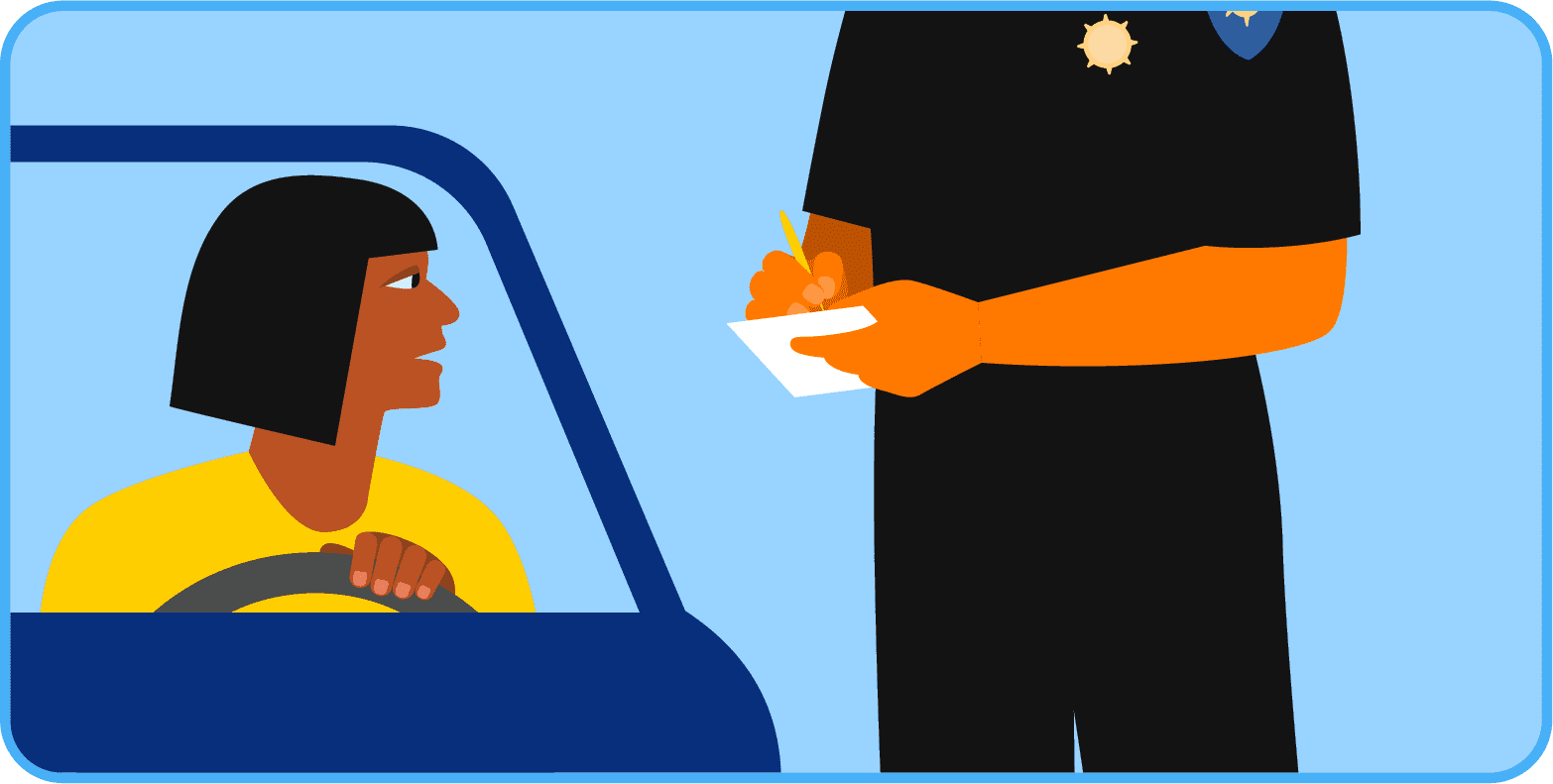
Under-18 drivers may not use their cell phones or other electronic wireless communications devices while operating a vehicle. This applies even if the device can be used in hands-free mode.
Exceptions to the Ban on Handheld Phones While Driving
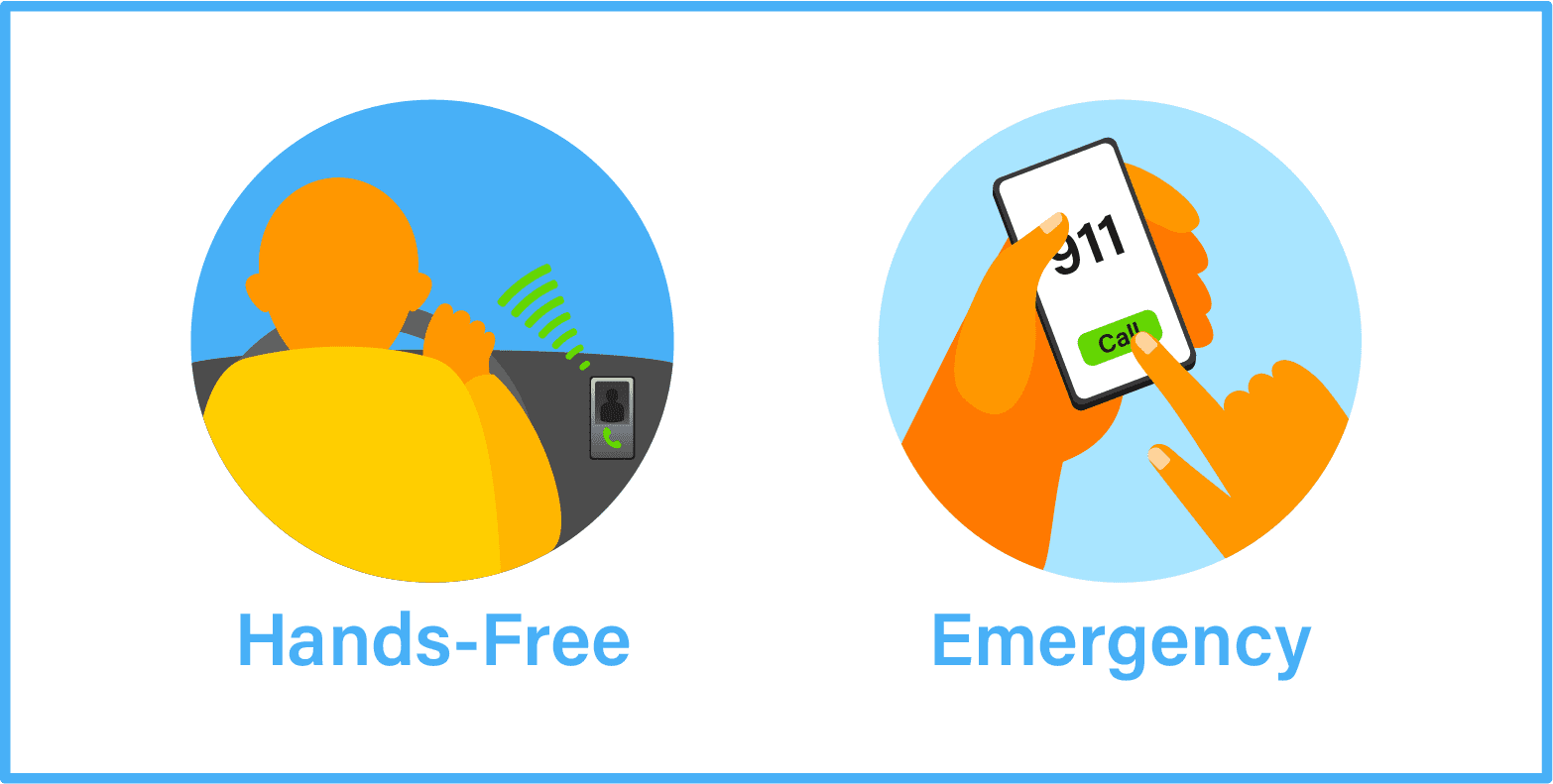
There are cases where you may use a handheld phone while driving without getting fined. These include:
- When making a call for emergency purposes
- When operating an emergency vehicle, as long as you’re using the phone for reasons within the scope of your job duties
- When driving on private property
All drivers, including those under 18, can use their phones in handheld mode to call emergency services.
How the Hands-Free Cell Phone Law Is Enforced
In California, police officers can pull you over if they see you using a handheld phone while driving, or suspect you are violating the law. They don’t need any other reason to stop your vehicle.
For drivers under the age of 18, police officers can’t pull over a driver just because they suspect they are underage and violating the hands-free cell phone law.
They can pull the driver over for another reason and then issue a cell phone ticket if they find evidence that the cell phone law was violated.
Additional Consequences of a Cell Phone Ticket in California
Just one cell phone ticket won’t impact your California driving record or auto insurance rates. But if you get two or more tickets within 36 months, the consequences can be dire. You can learn more in Does a Traffic Ticket Affect Your Insurance Costs?
Here’s what to expect.
Points on Your Driving Record
If you receive a cell phone ticket within 36 months of a prior cell phone ticket or any other distracted driving violation, you’ll get one point on your license. The point will remain on your record for 36 months.
You can mask the ticket from auto insurers, employers, and other third parties by taking a DMV-approved traffic course.
Increased Insurance Rates
Expect to pay higher auto insurance rates after getting two or more tickets for distracted driving. According to recent data, the average car insurance rate increase in California after a texting ticket is 45%. That’s more than in any other state.
Potential for Greater Penalties
Every cell phone ticket you get could bring you closer to license suspension. Under the California DMV point system, you’ll get your driver’s license suspended for six months if you accumulate the following:
- 4 points within 12 months
- 6 points within 24 months
- 8 points within 36 months
The penalties are even more severe if you ignore the ticket or cause an accident while using your phone behind the wheel.
Personal Injury Lawsuit
If you hurt someone in an accident where your phone was distracting you, you could be found negligent in a personal injury lawsuit. If this happens, you’re responsible for paying for all the damages of the accident.
According to the California Highway Patrol, using your cell phone while driving can increase your risk of a collision by a staggering 400%.
How to Avoid Cell Phone Tickets in California
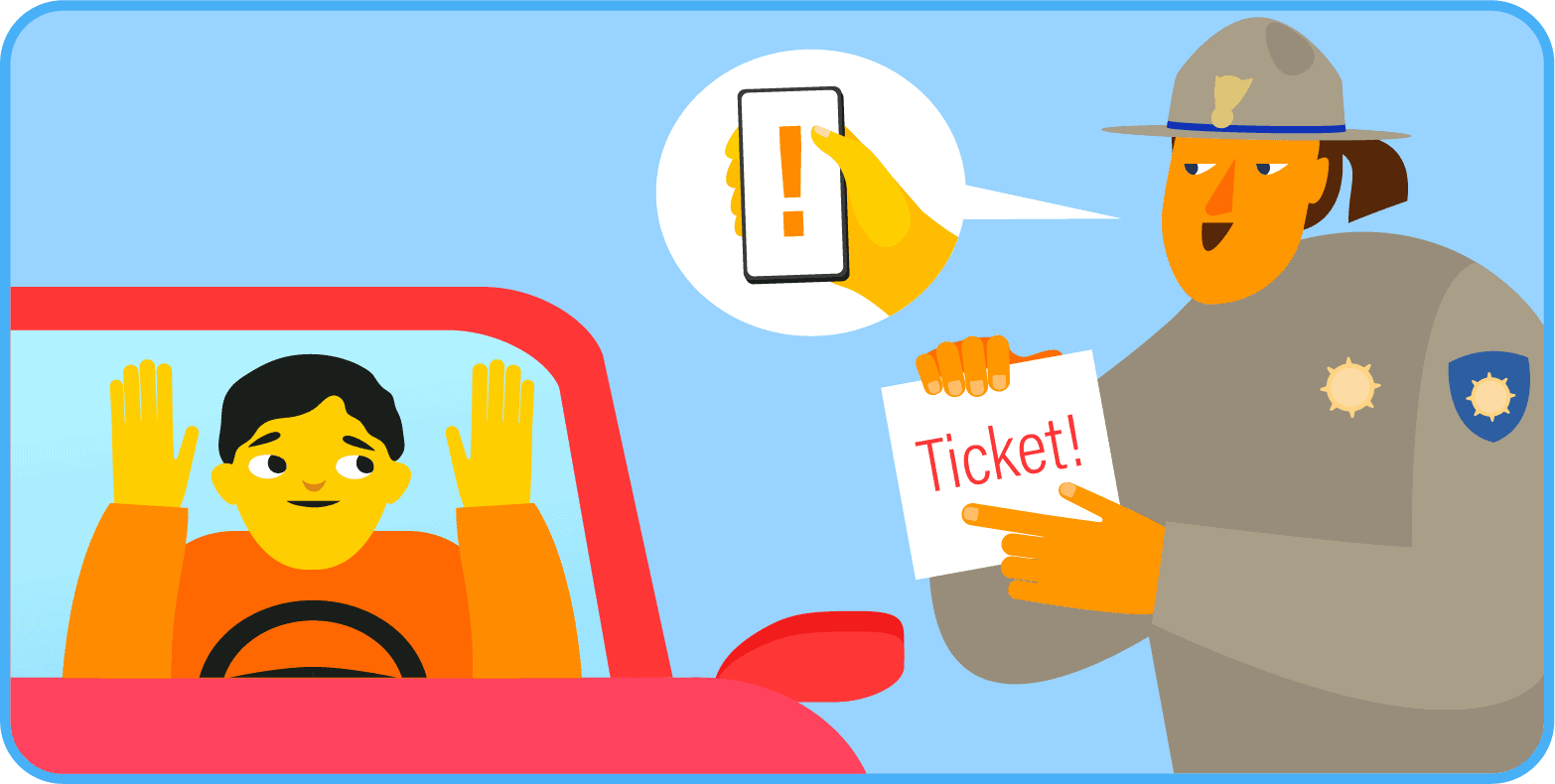
The easiest way to avoid a cell phone ticket in California – or any other state – is to put your phone away while driving! If that’s not an option, take some precautions to keep yourself and other road users safe.
Here’s what you can do:
- Switch to a headset, Bluetooth car system, or other hands-free communication devices.
- If you use your smartphone to listen to music, pick your playlist before hitting the road.
- Set up your phone’s GPS system before starting the car.
- Put your phone on silent or turn off app notifications while driving.
- Attach a phone mount to the windshield instead of keeping your phone in the car’s center console. This way, you’ll have the device at eye level.
- Enable Car Mode or voice commands on Spotify, Amazon Music, Apple Maps, and other apps.
- Use a virtual assistant, such as Amazon Echo Auto or the ROAV Viva Pro, to control your phone with voice commands.
Remember, you can always pull over to make a phone call or send a text message. Even hands-free devices can distract you and slow your reaction time, increasing the risk of a car accident.
Final Thoughts
The true cost of a cell phone ticket in California goes beyond fines. This traffic violation can also add points to your license, leading to higher insurance rates. Plus, there’s a risk of additional penalties, such as license suspension for repeat offenses.
If you get a second or third ticket for cell phone use while driving, consider going to traffic school. This would allow you to keep a point off your driving record and prevent your insurance premiums from increasing. Best Online Traffic School is a DMV-approved traffic school, and we serve all California counties, including San Diego, Los Angeles, Riverside, and Alameda. The best part is, you don’t pay until you pass!
Sign up for a FREE account with Best Online Traffic School to get started.
FAQs about Cell Phone Tickets in California
Need more information? Here are the answers to some frequently asked questions.
How long does a cell phone ticket stay on your record in California?
A cell phone ticket is a one-point violation. The point received will stay on your record for 36 months.
When is it legal for minors to use a cell phone without a hands-free device while driving?
California law doesn’t allow minors (18 or younger) to use a cell phone while driving unless they must call emergency services. Hands-free devices are off-limits, too.
How many points is a cell phone ticket in California?
A first-time cell phone ticket won’t add any points to your record. But if you get a second ticket for distracted driving over the next 36 months, you’ll receive one demerit point.
Is it illegal to be on your phone at a red light in California?
Using your phone at a red light is illegal in most states, including California.
Can I get a cell phone ticket dismissed?
You may be able to get a cell phone ticket dismissed if you fit one of the exceptions to California’s distracted driving laws.
For example, the judge may dismiss your ticket if you can prove that your vehicle was pulled over at the time of the offense. Or that you called 911 or other emergency services. You can also seek out a cell phone ticket dismissal service.
Do I need to go to traffic school for a cell phone ticket?
In California, it’s not required to attend traffic school for a first-time cell phone ticket (since it doesn’t carry any points). However, you may need to go to traffic school if you get a second or third ticket within 36 months.
